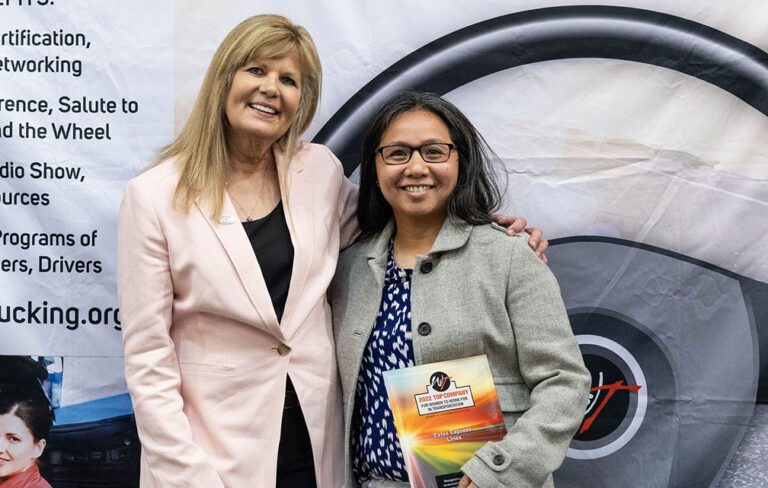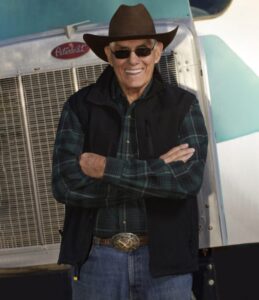Tammy Mangham has none of the traditional prerequisites generally seen in the leadership of trucking companies. She wasn’t raised in a trucking family, she didn’t work in a garage or warehouse, and she’s never been behind the wheel of a big rig.
None of that has kept Mangham from moving up the ranks of Estes Express Line’s Texas operations, where she’s now manager for the Virginia-based company’s Dallas terminal. In fact, Mangham is a prime example of the new generation of trucking management, one that’s expertly applying data-informed leadership skills in the trucking
marketplace.
“I graduated from college and started my career with Estes a little over 13 years ago,” Mangham said. “The truth is, my first exposure to trucking was in college. At the time, my college — the University of North Texas — was one of the first schools in the state that had a logistics program. What I learned there really did open my eyes, because I really didn’t know how big the logistics world was at the time.”
Graduating in 2002, the Texas native first worked for Central Transport and then for Central Freight Lines before landing at Estes as an office supervisor.
“I did that for about a year, and then my terminal manager at the time offered me the opportunity to be an operations manager to run our pick-up and delivery local department,” she recalled. “It was a pretty big operation — it had 70 P&D (pickup and delivery) drivers. That was my big step into the operations side.”
Promotions followed, bringing with them larger head counts and more responsibility. Mangham’s 70-driver outfit yielded to a 175-employee terminal and finally her current role, which employs nearly 400 people. At each stop, Mangham executed the same strategy of learning while leading.
“I asked a lot of questions, and I spent a lot of time with different groups of people,” she said.
“I was transparent with people and said, ‘Hey I’m just trying to learn what you do,’ or ‘Hey, would you mind letting me ride along with you just so I can see a day in the life of your job?’” she continued. “I have to rely on my employees a lot, and I’ve been able to learn by watching other people … who have more experience than me.”
In short order, Mangham’s understanding of the various parts of the operations multiplied considerably. She also scored points with the rank-and-file because of her work ethic and desire to take all points of view into consideration.
“Typically, I would work Monday through Friday — but let’s say there were people I wanted to talk to, and our schedules didn’t line up. What do I do? I showed up on a Saturday, I showed up on a Sunday, just to see something for myself,” she said.
“I don’t like to address things when I don’t have the complete picture, because everyone has their own perspective,” she added. “I’d change my schedule and do all that I could to get a complete picture from all the shifts versus just listening to one person or one group’s point of view.”
Mangham’s relatively uninitiated perspective was valuable in its own right, as it gave her the chance to view operations from an unbiased perspective. Being able to approach issues with a fresh set of eyes, she says, laid the groundwork for innovative solutions.
“I don’t know that I re-created the wheel on some of these things, but I think I asked the right questions,” she said. “Whenever I suggested something, people were often like, ‘Why didn’t we think of that?’ Usually, it’s because they never thought to ask. Oftentimes people just do what the normal routine is and as the saying goes, ‘We’ve always done it this way.’”
Mangham is quick to recognize the value and experience of each member of her team.
“Individually all of my people are smart, and they know their pieces well,” she said. “My role is to get them to put all the pieces together.”
This strategy has worked well, and each solved problem provides a baseline of knowledge to innovate in other areas. It’s also led to Mangham’s phone ringing with calls from other terminals throughout the company, with other Estes team members seeking to “pick her brain” on how to replicate similar successes.
“I do believe that I have made an impact,” she said. “There are terminals that have called me, or they’ve called my boss and ask, ‘How are you able to do this?’ ‘What did you do differently?’ What I value about our company’s culture is that it’s a culture where we just want to talk to each other and figure things out. There are really no dumb questions,” she said, adding that questions lead to discussions.
“I tell (other managers) all the ins and outs I’ve done, because that’s the culture my bosses before me built. That’s what we do,” she said. “For all the challenges that I have had, I think for the most part my reputation is that I try to do the right thing and try to help anybody that I can.”
Being relatively new to her current role, Mangham says there’s plenty left to learn and solve. Nonetheless, she knows she’s in the right place with the right company. After all, she’s faced similar challenges before.
“This is why I love Estes, hands down,” she said. “When I was in my first position as a terminal manager, I really didn’t know how to be one. I learned through that first experience. The first few weeks it wasn’t working out like I had envisioned. I remember feeling like, ‘This job is not me. I have my own show and I’m working long hours and giving it my all, but it’s not working.’”
That changed at Estes, she noted.
“One night, my district manager and my VP stopped by my terminal,” she said. “They weren’t there to beat me over the head. They were like, ‘Tammy, it’s time to go home. What can we do to help you get there?’ They were there to genuinely help me and show me they had my back. That was the day I knew, no matter what, I was gonna take care of the business.”
Dwain Hebda is a freelance journalist, author, editor and storyteller in Little Rock, Arkansas. In addition to The Trucker, his work appears in more than 35 publications across multiple states each year. Hebda’s writing has been awarded by the Society of Professional Journalists and a Finalist in Best Of Arkansas rankings by AY Magazine. He is president of Ya!Mule Wordsmiths, which provides editorial services to publications and companies.











